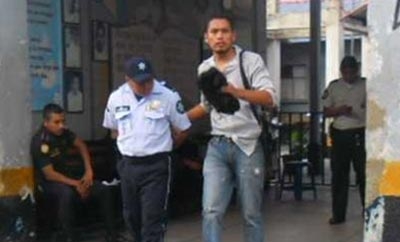The Guatemala government said that 99 percent of the country’s private security guards are working illegally,as efforts to regulate the booming private security sector — which has been accused of everything from extrajudicial killings to criminal ties — falls flat.
Only 400 of Guatemala’s 48,240 security agents have completed the training and certification required under the terms of a 2010 law regulating private security services (pdf), according to the Private Security Services Office (DIGESSP) of the Ministry of Interior, reported Prensa Libre (see their graphics below).
Of the 141 security companies registered before the law, 139 have yet to comply with the regulations, even though the deadline to do so passed in 2012. However, the head of the DIGESSP, Ana Patricia Monge, told La Horathat the certification process — which requires a training process of 10 to 30 days — only began this year.
In addition to registered security agents, there are an estimated further 30,000 to 40,000 private guards working clandestinely or for illegal security firms, according to a report accessed by Prensa Libre.
The 2010 law allows for prison sentences of six to 12 years for those who provide or knowingly hire uncertified security services.

InSight Crime Analysis
Sky high violence levels, and a lack of trust in corrupt and under-resourced public security institutions has led to a booming private security sector in Guatemala and its Northern Triangle neighbors Honduras and El Salvador. In 2012, an AFP report found that Guatemala had four private agents for every police officer.
The privatization of security has thrown up an array of its own security concerns. In Guatemala, private security firms have been accused of extrajudicial killings, collaborating with military personnel in Illegal Clandestine Security Apparatuses (CIACS) — which have strong ties to drug trafficking — and of being one of the country’s main purchasers of illegally trafficked arms.
Elsewhere in the region, private security firms even allegedly serve as smokescreens for criminal groups to carry out their activities.
With no sign of drastic improvements in the security situation in the Northern Triangle, private security firms are likely to remain a long term feature of public life, underscoring the importance of the type of comprehensive regulation attempted by Guatemala.
However, Guatemala’s torpid progress demonstrates how legislation alone is not enough, and must be backed by both the resources to make regulation practical and the enforcement to make non-compliance a serious issue. If not, there is a danger that private security could become part of the problem.

